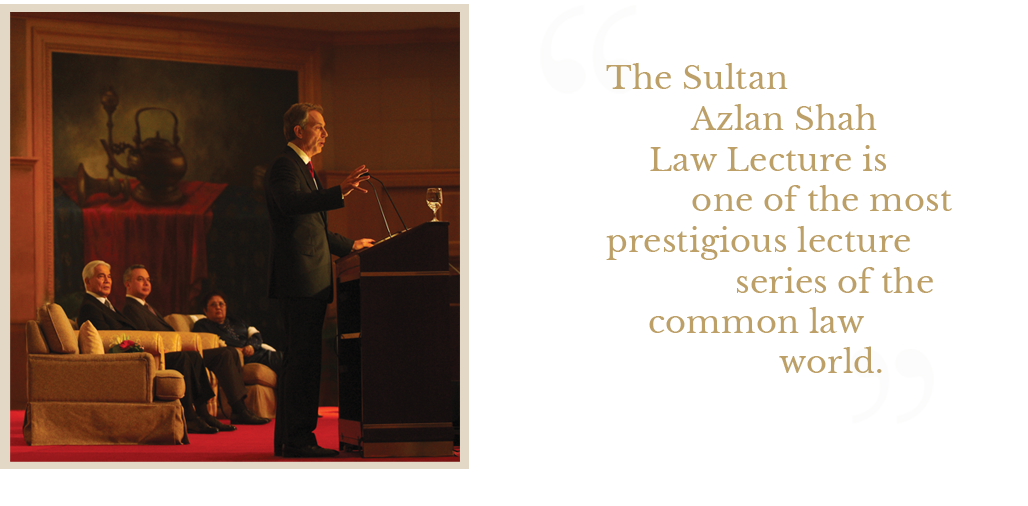The Sultan Azlan Shah Law Lectures

The Sultan Azlan Shah Law Lectures honours His Royal Highness Sultan Azlan Shah’s commitment to the Rule of Law, Constitutional Supremacy and Good Governance.
Established to honour His Royal Highness Sultan Azlan Shah’s contribution to the Faculty of Law, University of Malaya specifically, and to the development of Malaysian law generally, especially so since Merdeka, the Sultan Azlan Shah Law Lectures was conceived and initiated by Professor Dr Visu Sinnadurai during his tenure as Dean of the Faculty of Law, University of Malaya (1983-1986). Since 1986, when the First Sultan Azlan Shah Law Lecture was delivered in Kuala Lumpur, distinguished Lord Chancellors, a former Prime Minister of the United Kingdom, Lord Chief Justice of England and Wales, Masters of the Rolls, Lords of Appeal in Ordinary, Deputy Presidents and Justices of the Supreme Court of the United Kingdom, a former Chief Justice of Singapore, an Associate Justice of the US Supreme Court, a President of the New Zealand Court of Appeal, leading Queen’s Counsel and academics from the Commonwealth have been invited to partake in the premier law lecture series of Malaysia.
The eminent speakers, each conferring on the series the measure of prestige befitting its Patron, His Royal Highness Sultan Azlan Shah, have delivered authoritative, stimulating and thought-provoking lectures on a wide range of topics. The Sultan Azlan Shah Law Lectures has been described as “one of the most prestigious lecture series of the common law world.”
The First to Seventeenth Lectures were published in a volume entitled “The Sultan Azlan Shah Law Lectures: Judges on the Common Law” (Edited by Dato’ Seri Dr Visu Sinnadurai, Professional Law Books, 2004), the Eighteenth to Twenty-Fourth Lectures were published in a second volume entitled “The Sultan Azlan Shah Law Lectures II: Rule of Law, Written Constitutions & The Common Law Tradition” (Edited by Dato’ Seri Dr Visu Sinnadurai, RNS Publications, 2011), whilst the Twenty-Fifth to Thirty-Fourth Lectures were published in a volume entitled "The Sultan Azlan Shah Law Lectures III: Politics and the Judiciary, Executive Power & The Limits of Law" (Edited by Tan Sri Dr Visu Sinnadurai, RNS Publications, 2021).
The full text of the individual Sultan Azlan Shah Law Lectures have been made available with the kind permission of the publishers, and may be accessed in the links provided below. The full videos for selected lectures have been made available with the kind permission of the Sultan Azlan Shah Foundation.
The Sultan Azlan Shah Law Lectures
- Read
First Lecture (1986) | Professor WR Cornish
“Colour of Office”: Restitutionary Redress against Public Authority
- Read
Second Lecture (1987) | Professor AG Guest
Money in the Law
- Read
Third Lecture (1988) | Lord Oliver of Aylmerton
Judicial Legislation: Retreat from Anns
- Read
Fourth Lecture (1989) | Lord Ackner
The Spycatcher: Why Was He Not Caught?
- Read
Fifth Lecture (1990) | Sir Robin Cooke
Administrative Law Trends in the Commonwealth
- Read
Sixth Lecture (1991) | Lord Mustill
Negligence in the World of Finance
- Read
Seventh Lecture (1992) | Lord Donaldson of Lymington
Commercial Disputes Resolution in the 90’s
- Read
Eighth Lecture (1993) | Lord Mackay of Clashfern
Commercial Fraud Trials: Some Recent Developments
- Read
Ninth Lecture (1994) | Lord Keith of Kinkel
The Modern Approach to Tax Avoidance
- Read
Tenth Lecture (1995) | Lord Browne-Wilkinson
Equity and Commercial Law: Do They Mix?
- Read
Eleventh Lecture (1996) | Lord Steyn
Contract Law: Fulfilling the Reasonable Expectations of Honest Men
- Read
Twelfth Lecture (1997) | Lord Woolf
Judicial Review of Financial Institutions
- Read
Thirteenth Lecture (1998) | Lord Nolan
Certainty and Justice: The Demands on the Law in a Changing Environment
- Read
Fourteenth Lecture (1999) | Lord Slynn of Hadley
The Impact of Regionalism: The End of the Common Law?
- Read
Fifteenth Lecture (2000) | Lord Clyde
Construction of Commercial Contracts: Strict Law and Common Sense
- Read
Sixteenth Lecture (2001) | Lord Bingham of Cornhill
The Law as the Handmaid of Commerce
- Read
Seventeenth Lecture (2003) | Lord Phillips of Worth Matravers
Right to Privacy: The Impact of the Human Rights Act 1998
- Read
Eighteenth Lecture (2004) | Lord Saville of Newdigate
Information Technology: A Tool for Justice
- Read
Nineteenth Lecture (2005) | Cherie Booth QC
The Role of the Judge in a Human Rights World
- Read
Twentieth Lecture (2006) | Justice Anthony Kennedy
Written Constitutions and the Common Law Tradition
- Read
Twenty-First Lecture (2007) | Baroness Helena Kennedy of The Shaws QC
Legal Challenges in Our Brave New World
- Read
Twenty-Second Lecture (2008) | Tony Blair
Upholding the Rule of Law: A Reflection
- Read
Twenty-Third Lecture (2009) | Lord Mance of Frognal
The Changing Role of an Independent Judiciary
- Read
Twenty-Fourth Lecture (2010) | Lord Rodger of Earlsferry
Bias and Conflicts of Interests–Challenges for Today’s Decision-Makers
- Read
 Watch
Watch
Twenty-Fifth Lecture (2011) | Lord Walker of Gestingthorpe
Would it have Made Any Difference? Cause and Effect in Commercial Law
- Read
Twenty-Sixth Lecture (2012) | Lord David Pannick QC
Scandalising the Judiciary: Criticism of Judges and the Law of Contempt
- Read
 Watch
Watch
Twenty-Seventh Lecture (2013) | Lord Sumption
The Limits of Law
- Read
 Watch
Watch
Twenty-Eighth Lecture (2014) | Lord Carnwath of Notting Hill
Environmental Law in a Global Society
- Read
 Watch
Watch
Twenty-Ninth Lecture (2015) | Lord Dyson
Is Judicial Review a Threat to Democracy?
- Read
 Watch
Watch
Thirtieth Lecture (2016) | Baroness Hale of Richmond
The Supreme Court: Guardian of the Constitution?
- Read
 Watch
Watch
Thirty-First Lecture (2017) | Lord Thomas of Cwmgiedd
The Rule of Law, the Executive & the Judiciary
- Read
 Watch
Watch
Thirty-Second Lecture (2018) | Lord Reed
Politics and the Judiciary
- Read
 Watch
Watch
Thirty-Third Lecture (2019) | Lord Briggs of Westbourne
International Commerce: Mapping the Law in a Borderless World
- Read
Thirty-Fourth Lecture (2021) | Dato' Seri Chan Sek Keong
Judicial Power and Constitutional Supremacy—Basic Features of Written Constitutions?






